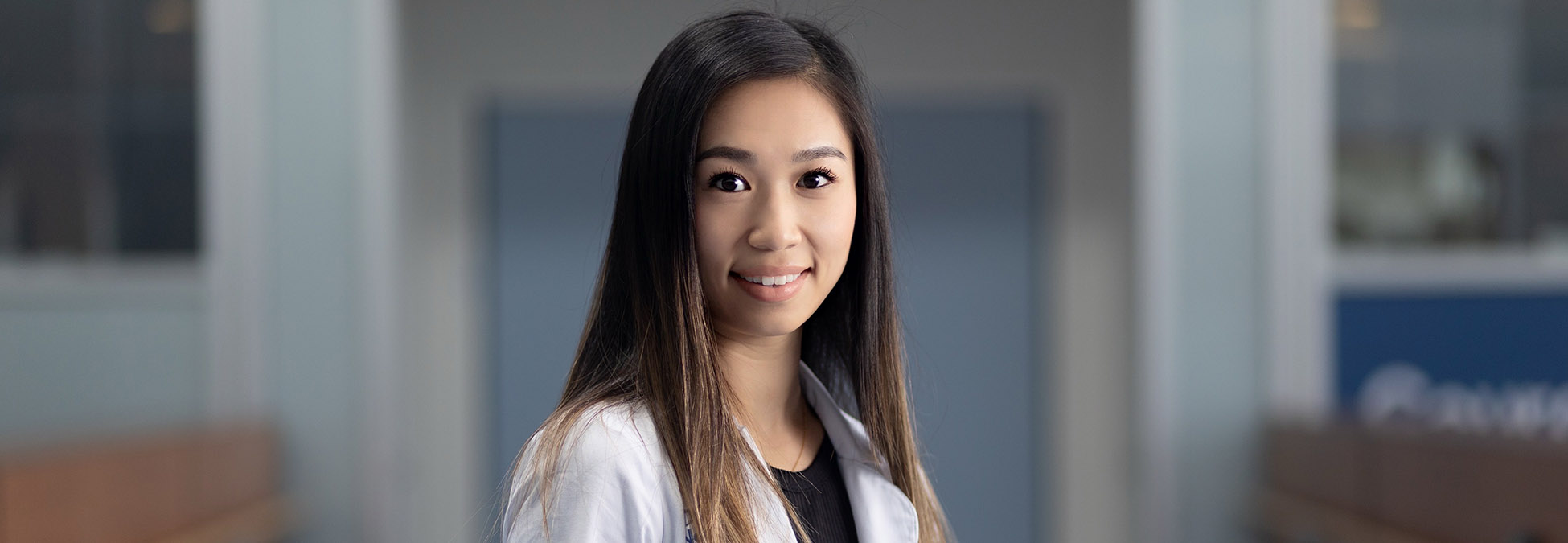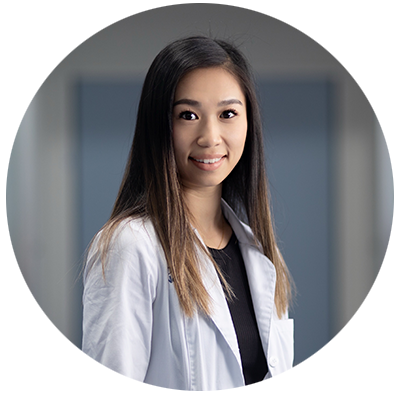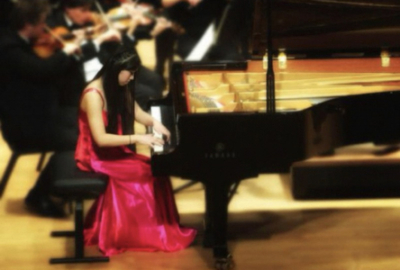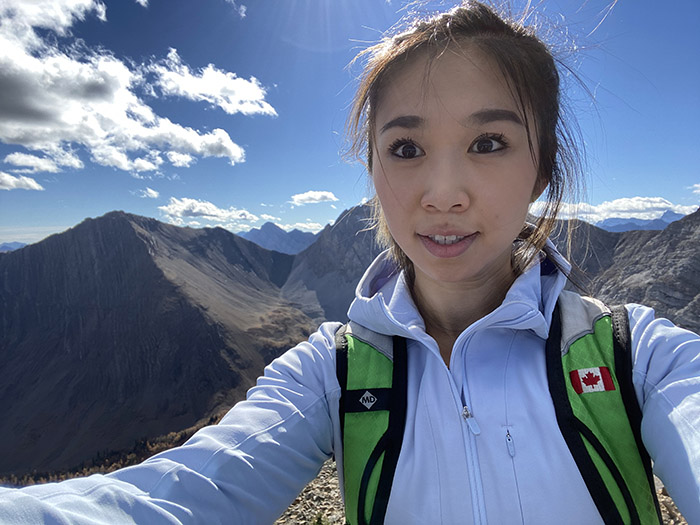
Striking a chord with stroke research
Meet Dr. Ronda Lun — recipient of a rare honourable mention for the 2022 Worton Researcher in Training Award

Why do some people recover from their strokes while others don’t? Dr. Ronda Lun is answering questions like this one through her boundary-pushing stroke research. Author of over 34 papers, a recipient of the highest honour for emerging researchers from the American Academy of Neurology, and now, an honourable mention for the 2022 Worton Researcher in Training Award from The Ottawa Hospital, Dr. Lun combines clinical practice with practice-changing research every day.
Keep reading to learn about what motivated Dr. Lun to become a neurologist — and what drives her research.
Why do some people recover from their strokes while others don’t? Dr. Ronda Lun is answering questions like this one through her boundary-pushing stroke research. Author of over 34 papers, a recipient of the highest honour for emerging researchers from the American Academy of Neurology, and now, an honourable mention for the 2022 Worton Researcher in Training Award from The Ottawa Hospital, Dr. Lun combines clinical practice with practice-changing research every day.
Keep reading to learn about what motivated Dr. Lun to become a neurologist — and what drives her research.
Q: Can you tell us a bit about your childhood?
A: I was born in China, and my parents and I immigrated to Canada when I was eight. I lived in Calgary until I moved to Ottawa to do my medical residency at The Ottawa Hospital.
My dad was a neurosurgeon when we were in China, so I was always fascinated by neuroscience and the brain, and I always looked up to my dad.
Then when I was around 10, I started playing piano and really fell in love with classical music.

Q: Can you tell us a bit about your childhood?
A: I was born in China, and my parents and I immigrated to Canada when I was eight. I lived in Calgary until I moved to Ottawa to do my medical residency at The Ottawa Hospital.
My dad was a neurosurgeon when we were in China, so I was always fascinated by neuroscience and the brain, and I always looked up to my dad.

Then when I was around 10, I started playing piano and really fell in love with classical music.
Q: How did you decide to study neuroscience?
A: Neuroscience and piano were my two big interests growing up, and I had a very hard time deciding what I wanted to pursue at the end of high school.
To be honest, I didn’t see my dad very much when I was younger, because he was so busy with work. But when he would come home, he would tell us stories about patients he helped, and how grateful families were that he was able to help them in some way. I really admired how generous and kind he was — and how caring he was for his patients. That was something I wanted to emulate.
I wound up doing my undergrad with a major in neuroscience and a minor in piano. But I actually didn’t finish my undergrad degree, because I ended up going to medical school before the end.
Q: Why did you choose to do your residency at The Ottawa Hospital?
A: As a final year medical student, we do electives at various universities, and I came to Ottawa for one. I remember being blown away by how nice and how willing to teach everyone was. My first day on stroke service with Dr. Michel Shamy, one of the stroke neurologists here at The Ottawa Hospital, he took me to a patient’s bedside and he walked me through how to do an acute stroke assessment, step by step. I felt so important, and I felt like people valued my education and wanted me to succeed, which I think really kind of set The Ottawa Hospital apart from other institutions I had rotated through. It’s such a supportive environment; I knew I wanted to come here for more training.
It’s such a supportive environment; I knew I wanted to come here for more training.
Dr. Ronda Lun
A: As a final year medical student, we do electives at various universities, and I came to Ottawa for one. I remember being blown away by how nice and how willing to teach everyone was. My first day on stroke service with Dr. Michel Shamy, one of the stroke neurologists here at The Ottawa Hospital, he took me to a patient’s bedside and he walked me through how to do an acute stroke assessment, step by step. I felt so important, and I felt like people valued my education and wanted me to succeed, which I think really kind of set The Ottawa Hospital apart from other institutions I had rotated through. It’s such a supportive environment; I knew I wanted to come here for more training.
It’s such a supportive environment; I knew I wanted to come here for more training.
Dr. Ronda Lun
I didn’t really realize my full academic potential until I started my residency at The Ottawa Hospital, and I feel like coming to Ottawa was the best decision I ever made.
Q: How did you get into more research?
A: When I started my residency, I had no experience at all in clinical research. I had just done a little bit of lab research as an undergrad. As a resident, I was open to exploring all opportunities, so I started talking with some of the staff here at The Ottawa Hospital, and I ended up finding an area of research that I’m really quite passionate about — intracerebral hemorrhage. That was when I realized, despite all the clinical things we do on a day-to-day basis, there is still so much we don’t know about this disease, and still so much we could learn. At first, I was just focused on how to do that research. But then I found the more research I did, the more I realized I didn’t have the necessary statistical skills or epidemiology tools I needed to push stroke research even further. That’s what got me really interested in epidemiology and made me want to pursue a master’s degree during my training.
Q: How does your stroke research intersect with cancer research?
A: The medical community has known cancer can cause a hypercoagulable state for a long time — cancer increases your chance of forming blood clots. But the majority of research done around cancer and blood clots has actually been on venous clots, and stroke is an arterial type of clot, so it’s different. We don’t know very much about who gets a stroke after a cancer diagnosis — or which types of cancer are the most at risk. I thought it was the perfect topic to dive into with my master’s thesis.
We found a couple interesting things from my research. We found that during the first year following a new cancer diagnosis, your risk for stroke is three times higher than someone in the general population.
As neurologists, this is quite exciting, because it represents a window of opportunity where we can try to prevent a stroke from happening after a cancer diagnosis. And when patients have a stroke that we can’t find a source for, we can start thinking about whether there’s an underlying cancer that’s undiagnosed.
That’s what I think is the most exciting part about some of these findings; we can really make a difference in these people’s lives.
Q: What motivates your work?
A: My clinical work is what drives me to better my research — the two go hand in hand. I would never have dreamed this is where I would be in five years when I first started my residency.
It’s super exciting to know the research I’m doing is making an impact, and I also get to see patients on a day-to-day basis who inspire me to find answers.
It’s extremely humbling to think about how much progress we have yet to make in the field of stroke treatment, especially in these understudied areas such as cancer-associated stroke.
Q: Where might we find you outside the lab?
A: It’s hard to keep up with music, especially when you’re doing a residency and research, but I do love attending concerts and musical festivals. I also love keeping active: running and hiking and going to the gym. It’s nice to have a balance of work during the week and fun on the weekends.

It’s super exciting to know the research I’m doing is making an impact, and I also get to see patients on a day-to-day basis who inspire me to find answers.
It’s extremely humbling to think about how much progress we have yet to make in the field of stroke treatment, especially in these understudied areas such as cancer-associated stroke.
Q: Where might we find you outside the lab?
A: It’s hard to keep up with music, especially when you’re doing a residency and research, but I do love attending concerts and musical festivals. I also love keeping active: running and hiking and going to the gym. It’s nice to have a balance of work during the week and fun on the weekends.


